President Vladimir Putin said he was in favor of only "minimal" restrictions on the Internet, but added that he expected Russian citizens to respond with a forceful promotion of Moscow's views to any "hostile" publications online. Putin made the comments during a meeting with young IT professionals taking part in the National Education Youth Forum.
In the meeting, which was held Tuesday in the Vladimir region, Putin also promised to "think about" delaying implementation of a law that requires online companies to store Russian users' data in Russia, the Kremlin said in a statement Tuesday.
The law, which is now set to take effect on Sept. 1, has drawn harsh criticism from Internet freedom advocates, who view it as part of the Russian government's broader move to tighten control over online communications.
Putin reproached online companies for being "unprepared" for the September date and for requesting more time.
"But still we can think about it," he said. "Let me talk to the Cabinet — I have a meeting with the Cabinet literally within a couple of days. We will hold a discussion, I will put this question to my colleagues."
Putin also insisted he supported online freedom, within limits.
"We believe, and I personally believe, that restrictions should be minimal," he said. You know, the way I see it, in order to protect our people, especially young people, from detrimental or even hostile — which is quite possible — influences, one should not forbid reading, viewing or listening to something, but we should ourselves promote our position. So that our people could be prepared to receive any kind of information and are able to respond in a harsh, timely, beautiful and talented manner. And I very often see this in fact happening," Putin added.
Russia has scores of so-called Internet trolls, deluging websites with posts praising Moscow's policies. Many are employed by companies that media reports have linked to the Kremlin.
Meanwhile, the "minimal" restrictions Putin was referring to currently include another law that the president signed this week that will require search engines to remove the personal information of Internet users from search results on request if the information is "in violation of Russian Federation law, is false or outdated."
The law, which is widely known as the "right to be forgotten" law, sets no criteria for evaluating the correctness and relevance of the disputed information, but the Kremlin said in a statement that users can turn to the courts if search engines deny their requests.
Critics said the law opened the way for Russian politicians to prevent the public from learning about their past misdeeds or false statements by removing any mention of them from search results.
"This is a law on arbitrary and comfortable laundering of reputations. This is a law on allowing people to lie," journalist Sergei Parkhomenko said in a program on independent Ekho Moskvy radio when the bill was debated earlier this summer.
One of the examples Parkhomenko mentioned in the program was Putin's initial denial that Russia had dispatched troops to Crimea before annexing it from Ukraine last year. The president later conceded that the troops who overran the peninsula were Russian forces.
The Organization for Security and Cooperation in Europe's media freedom representative, Dunja Mijatović, denounced the law on Tuesday, saying it had "a great potential to negatively affect the free flow of information online and access to information, damage the universality of the Internet and eventually result in content restrictions by private entities."
"The statutory requirement to delete access to online information, worded in broad and vague terms, represents a clear threat to freedom of information and goes further than already existing provisions in this area within the OSCE region," she said in a statement.
Putin told his audience that Russia's restrictions were in the same league as European ones that require search engines to remove URLs at an individual's request.
"A society has a right and obligation to protect itself," he said. "Many European countries are already taking necessary actions. I am not talking about China — that's a separate topic, the state there monitors this sphere with sufficient strictness. But in Germany, in Great Britain, sufficiently serious restrictions are being introduced. We are not planning any additional restrictions."
Russian Internet activist Anton Nosik has harshly lampooned government assurances earlier this summer that the law resembled European ones.
"Russia can truly pass any law. For instance, one that would require us to pay for each use of the Cyrillic script to [Kremlin-linked film director] Nikita Mikhalkov," Nosik wrote in a blog on the Ekho Moskvy radio website. "But please don't say that it is the same somewhere else in the world. In any country where governments change through free democratic elections, such pornography is unthinkable even in theory."
A Message from The Moscow Times:
Dear readers,
We are facing unprecedented challenges. Russia's Prosecutor General's Office has designated The Moscow Times as an "undesirable" organization, criminalizing our work and putting our staff at risk of prosecution. This follows our earlier unjust labeling as a "foreign agent."
These actions are direct attempts to silence independent journalism in Russia. The authorities claim our work "discredits the decisions of the Russian leadership." We see things differently: we strive to provide accurate, unbiased reporting on Russia.
We, the journalists of The Moscow Times, refuse to be silenced. But to continue our work, we need your help.
Your support, no matter how small, makes a world of difference. If you can, please support us monthly starting from just $2. It's quick to set up, and every contribution makes a significant impact.
By supporting The Moscow Times, you're defending open, independent journalism in the face of repression. Thank you for standing with us.
Remind me later.






